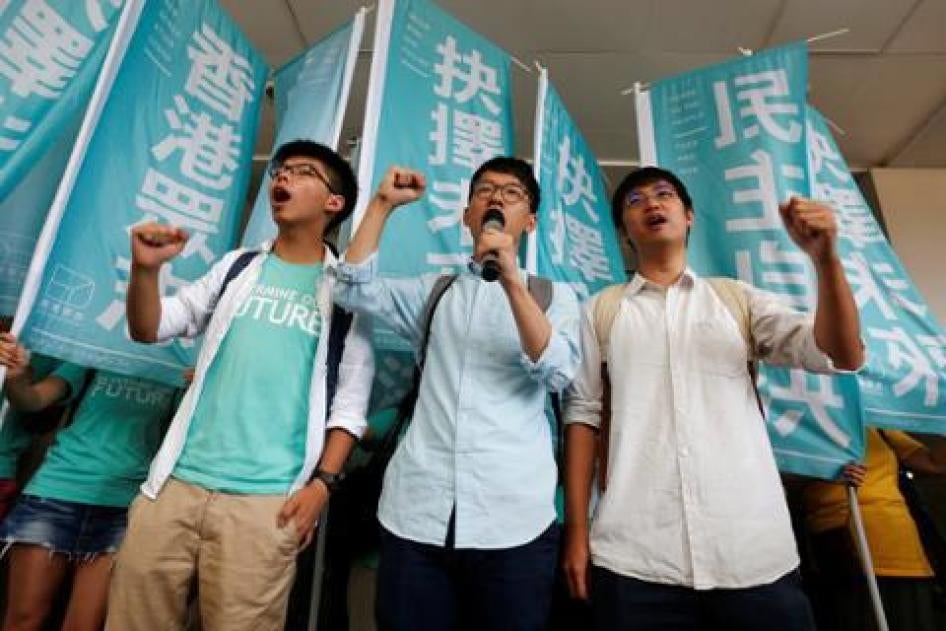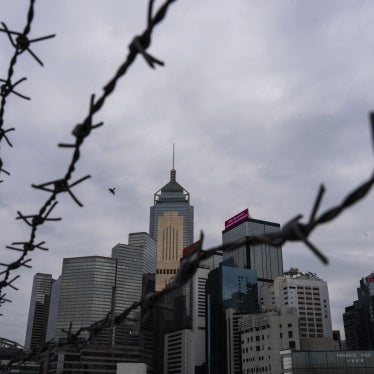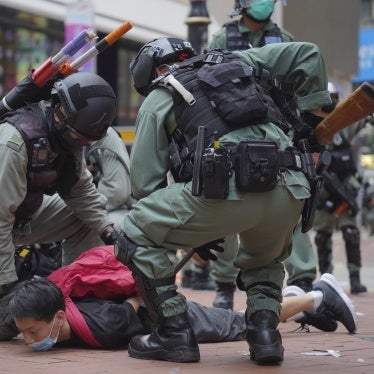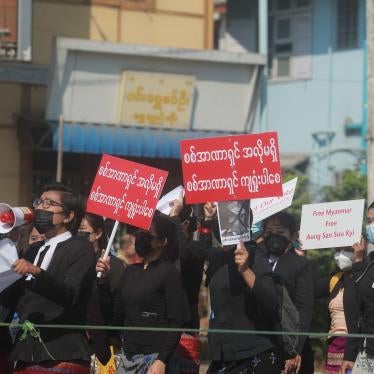(New York) – On August 15, 2016, a Hong Kong court sentenced three student leaders in violation of their rights to peaceful expression and assembly, Human Rights Watch said today. Alex Chow was given a three weeks sentence with a one year suspension while Joshua Wong and Nathan Law were given community service orders of 80 hours and 120 hours, respectively. Chow and Wong were convicted of “unlawful assembly,” while Law was convicted of “incitement,” offenses under Hong Kong’s Public Order Ordinance. The charges stem from their leadership of a peaceful sit-in that triggered the 79-day pro-democracy Umbrella Movement in 2014.
The Hong Kong government should quash the convictions of the students and revise the Public Order Ordinance to bring it in line with international human rights standards.
“In sentencing these students, Hong Kong authorities' behavior increasingly resembles that of their counterparts in Beijing,” said Sophie Richardson, China director. “Leading peaceful protests is no crime, and the charges against the three should be dropped.”
The sit-in occurred on September 26, 2014, in Civic Square, a space outside Hong Kong government headquarters. The area had previously been open to the public for protests, but the government sealed it off in 2014 for unspecified “security reasons.” Authorities erected a three-meter-high fence around the site and restricted gatherings of members of the public to Sundays or public holidays only, and solely with government permission. The Hong Kong Federation of Students, headed by Chow and Law at the time, had applied twice to use Civic Square between September 23 and October 3, 2014, but was rejected by the government due to unspecified “security reasons.” On September 27, 2014, the authorities arrested 61 protesters, including Wong, Chow, and Law.
On July 21, 2016, the court convicted the three student leaders, finding that the protesters, who had forced their entry into the area by “climbing over the fence and pushing the gate” before sitting down peacefully, had “conducted themselves in a disorderly and intimidating manner.” The court found that such conduct was “likely to cause any person reasonably to fear that the persons so assembled would commit a breach of the peace, or would by such conduct provoke other persons to commit a breach of the peace.”
Hong Kong has a longstanding tradition of tolerating peaceful demonstrations, but recent reports suggest an increasing number of arrests and prosecutions against protesters, some under the Public Order Ordinance. Beyond the unjust punishment faced by Wong, Chow, and Law, the prosecutions send a broader message to Hong Kong society about participation in peaceful public protest.
“If students are going to get prosecuted for ‘unlawful assembly,’ what other behavior is now off limits, and will people think twice before exercising their rights to peaceful expression?” Richardson said.
Hong Kong’s Public Order Ordinance has been criticized by the United Nations Human Rights Committee for possibly “facilitat[ing] excessive restrictions” to basic rights. The law, which requires that processions involving more than 30 people and assemblies with more than 50 must apply for and receive a “letter of no objection” from the government in advance, is incompatible with the International Covenant on Civil and Political Rights (ICCPR), which applies to Hong Kong. In 1995 the British colonial government revised the ordinance to bring it into compliance with such standards; people hosting demonstrations would only have to notify the police, not obtain permission. But this proposal and other positive revisions were repealed by the central Chinese government in the preparations for Hong Kong’s handover to Chinese sovereignty in 1997. The restrictive revisions of 1997 were adopted despite strong opposition in Hong Kong.
Hong Kong people are entitled to choose their top leaders through universal suffrage, according to the Basic Law – its functional constitution – and the ICCPR. However, the Chinese and Hong Kong governments have backtracked on this promise through a series of decisions since 1997. In August 2014, China’s national legislature imposed a stringent screening mechanism that effectively bars candidates the central government dislikes from nomination for chief executive. That decision triggered the Umbrella Movement in 2014. In July 2016, the Hong Kong government placed greater restrictions on people’s electoral rights by requiring candidates running for its Legislative Council to declare their recognition of Hong Kong as an “inalienable part” of China. It then disqualified six candidates for their pro-independence stance.
“Hong Kong’s future depends on authorities devoting their energies to upholding – not reducing – civil and political rights,” Richardson said. “These prosecutions and sentences should unnerve anyone who cares about the fate of basic rights in Hong Kong.”








